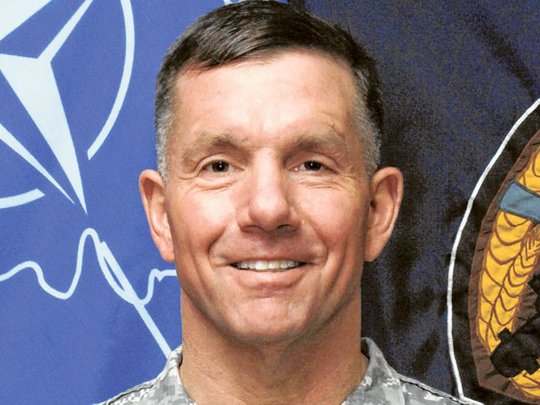
Dubai: The Afghan security forces will be prepared to take the leading role in their country's security when foreign troops withdraw in around three years' time, a top US military official said yesterday.
Lieutenant General William Caldwell, commander of the Nato Training Mission in Afghanistan, told a small group of journalists in Dubai yesterday that after December 2014 the role of international troops will become more advisory and supporting.
"By December 2014, the international community and America will shift their priority in Afghanistan from conducting combat operations to supporting, advising and assisting operations. [There will be] a very different way of doing things... But there will be still a presence there to help the Afghans," Lt. Gen. Caldwell said.
This presence, the veteran US general explained, will be for training, advising and assisting the Afghan troops.
"In three years from now, the Afghan police and army will be capable, will be trained, equipped and manned, so that by December 2014 they can be in the lead for security inside of Afghanistan. And I am very comfortable in saying that this is an attainable goal that will happen."
Most international combat troops are set to leave Afghanistan and transfer security to Afghan forces by the end of 2014.
The US has nearly 130,000 troops in Afghanistan, constituting the biggest foreign contingent of the Nato forces in the war-torn country. Washington had already announced two years back plans to withdraw more than some 30,000 of the troops and already, 10,000 American troops have been ordered to return by the end of the year. While most of them will be support troops, one-third will be combat forces, US military officials said.
On the right path
On Wednesday, France announced it was withdrawing 200 of its troops from Afghanistan, as part of a plan to pull out 1,000 troops by the end of next year, out of nearly 4,000 troops there.
Caldwell, who is also the Commanding General of the Combined Security Transition Command in Afghanistan, stated that there has been "significant growth" on the ground in Afghan forces in the past two years.
He said they are "on the right path" and considerable progress has been reported in increasing the literacy rate among members of the police and army, as also in gender integration where many women have been drafted into the Afghan forces, including the air force. He also reported progress in building the ability among many Afghans to start businesses.
Caldwell praised the UAE's leading role in the field of education and training of Afghan forces, and also said that the UAE, along with the US, is one of the largest contributors in this respect.
Today there are 17,000 jobs in Afghanistan that were not available two years back, he added.
Afghanistan's path to success and flourishing is through providing people with education, he said, describing it as the "most critical thing" for the leadership to focus on.
"These people have the desire, the motivation; they just don't have the opportunity to be educated," Caldwell said.
For example, the number of Nato trainers is expected to be reduced from 5,300 to 2,000 in three years, and the number of Afghan forces will increase from 307,000 at present to 352,000 by October 2012.
Meanwhile, Caldwell stressed the importance of Pakistan's role in finding a solution to Afghanistan's problems.
"They [the Pakistanis] have to be part of the solution. Dialogue and negotiations with them is absolutely imperative," he said.
Both the US and Pakistan share the goal of enabling the Afghan forces to have a strong role in looking after the security and stability in their country, Caldwell said.












